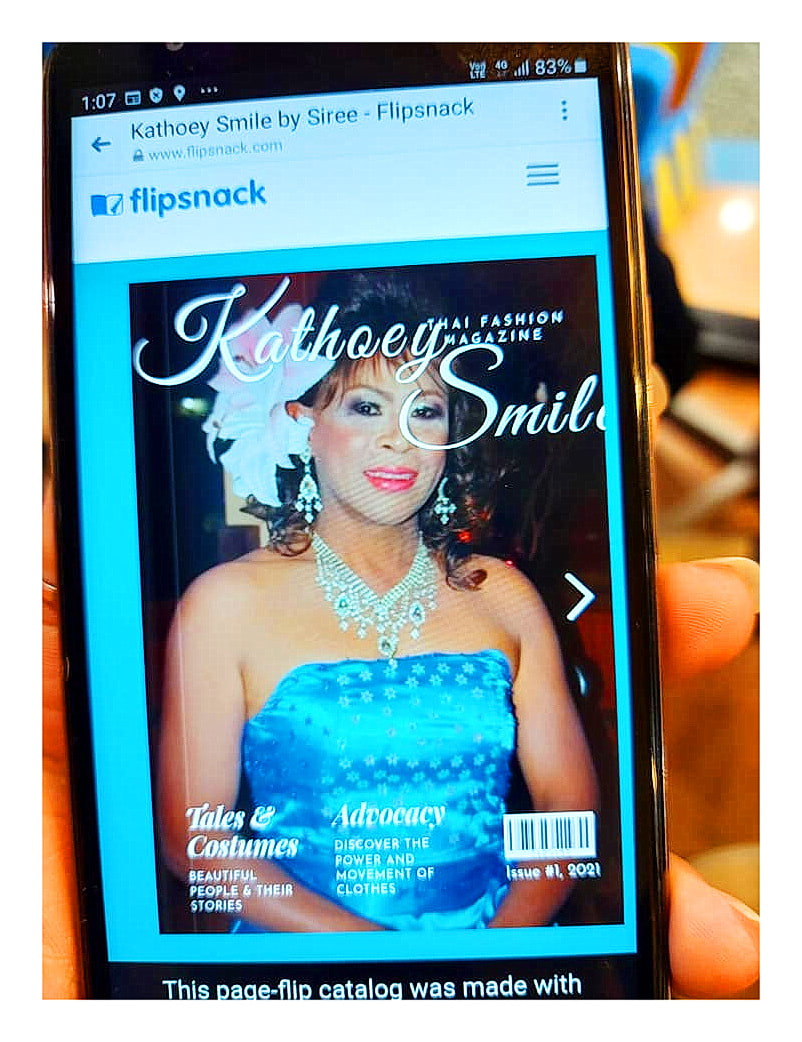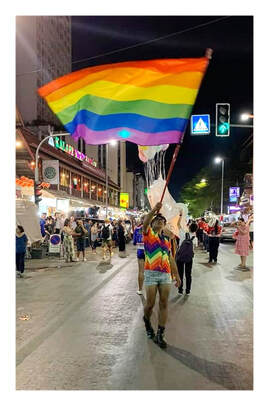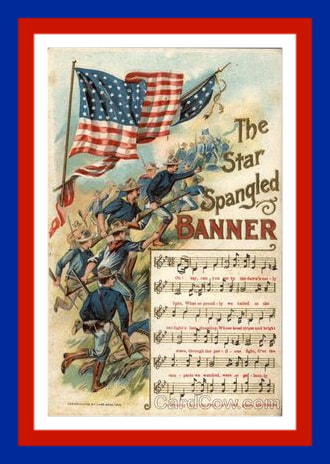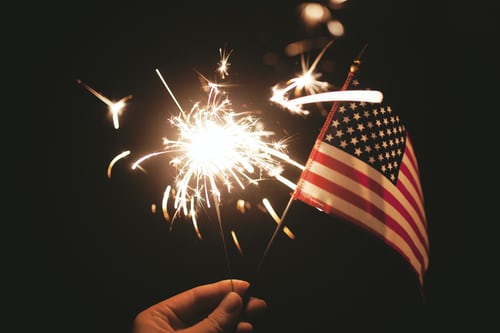|
GETTING THE LOOK TO MATCH THE GENDER
Granddaughter Siree McRady took a course in Berea College that considered the boundary between gender reality and gender portrayal. Having grown up in Thailand, Siree was familiar with how Thai culture impacts social manifestations. Her challenge was to create a “presentation” that was succinct and accurate. She decided on a magazine format with articles about three individuals who have taken different routes in support of gender diversity through costumes and advocacy. I think her production is superior. Here’s how you can see it, too: https://www.flipsnack.com/AD5C5B5569B/kathoey-smile.html
0 Comments
Phase One: Ignorance
I grew up in a time when being gay was intolerable. The very idea was scandalous and frightening. No academic resource or medical advice said otherwise. Whatever interests or inclinations we might have had were dismissed as something else than expressions of essential reality. Only in retrospect were my own many little incidents understood accurately. Phase Two: Arousal In the summer of 1956 I had a major “religious experience” that formed the very core of my identity and direction. From that experience on, nothing else mattered as much as following the “call to ministry”. Any departure from that line for my life was to be rejected. That included, of course, all moral recourses. I did, eventually (at age 22), resolve my conflict over masturbation once I began to find medical and then religious teaching that permitted it. But the “great test” came in the summer after my 27th birthday when I was a hospital patient and a male nursing assistant gave me a sponge bath that included the bold suggestion that we could go further. It scared me out of my wits. The only thoughts I had was how much I wanted him to take over, and how I was sure it would mean discovery, disgrace and dismissal from my church position and the end of my whole life path. Fear won that day. Phase Three: Denial I resolved to take the cure that the experts all agreed would work, and that was to get married. Sex in marriage would overcome all other interests. Within a year I was married. For a decade that was pretty fine. Then came a second decade when I knew I was struggling and losing the battle to divert my attention. I could do OK except when I was asleep. My dreams were out of control. They spurred fantasies I knew were hopes, voyeur efforts that became suspected by others, and other adventures that were out of control but I convinced even myself were just studies. The third decade is when it all fell to pieces. Phase Four: Collapse By 1990 medical and even religious advice was concluding that sexual diversity is not against the design of nature as had been contended for centuries, nor was sexual activity contrary to God’s will for life. I was still convinced that there was possibly a cure for my obsessive interests and impulses. I explored all of them except aversion therapy. Finally I gave up and tried one last thing. I decided to have a go at gay sex. At the time, I was convinced that I would find it so repulsive that would be the cure. For years I had been fascinated by a former student, now graduated and living with a boyfriend. I confessed my plan to get “a gay massage” to try out gay sex. He offered to be my teacher instead. One night in June 1995 we had sex. My defenses collapsed. It was the first sex of my life that was fulfilling, and not just satisfactory. I knew instantly I had discovered the best way for me to have sex. That led to 5 years of effort to accommodate my commitments to our marriage, my ordination vows and ministry, and this new reality. Eventually that did not work. Phase five: Resolution In 2000 things came to a head. My marriage had unraveled into a “trial separation”. I got a case of Hepatitis B as a result of unprotected sex with a tourist in the most famous gay spa in Bangkok. I nearly died, but Pramote, a Thai friend, stayed resolutely by my side night and day. It dawned on me that he loved me. When I recovered my wife announced she was going to get a divorce and I agreed to it. At that period I had another “religious experience” of call to ministry in which I “heard” Christ say to me, “Why are you not ministering to gay people as I have directed you to do?” I cannot exaggerate how liberating that experience was, although I knew nothing about how to really do ministry like that. Gay ministry in an overwhelmingly Buddhist setting would take a form I had never imagined. It was very unlike any ministry I had ever considered. I also began work away from Chiang Mai in order to have distance from my past and because the opportunity came. So Pramote and I began life together in Nakhon Pathom and Bangkok. This meant I was in a relationship. When a conservative missionary denounced this and incited the church leadership “to pray for me”, I was obliged to withdraw from church work and began a new career in higher education administration. Coming out for me included not only coming out of the closet and giving up trying to be discrete or to hide my sexual identity, but also getting out of one marriage and into a second one, and being out of institutional forms of pastoral ministry into unexplored ministerial territory. Postscript: Pramote and I were married in a Thai ceremony twenty years ago. We were later officially married in the USA. Both of our families are reconciled to our committed relationship and so is our village community. We live on a small farm outside of Chiang Mai. Suppose I were a teenager in America in 2021 and I got my picture on the local nightly news marching in a Gay Pride parade. My cousin saw the news and next day he and 6 or 8 of his friends met us coming into our high school. They were holding a banner reading PROUD TO BE STRAIGHT. In all our classrooms they had written the same motto on the boards. Suppose this followed incidents in our town of bullies picking on gay kids.
How would I feel that day? Well, being me (as I imagine this scene), I’d feel vulnerable and embarrassed. But some other gay kid with a different personality and experiences might feel frightened and even suicidal. Another gay guy might feel enraged. It is unlikely I’d feel, “Wow! It’s great that my cousin is exercising his right to freedom of expression!” Now suppose this happens to be the day a new high school principal arrives and there is an assembly to introduce her. In her remarks she says, “It will be school policy from now on to highlight the contributions and heritages of minority groups in our school. That will include LGBTs, Native Americans, Hmong, and Cubans.” I think I’d be feeling a little encouraged that we were going to get a chance to shine instead of hide. I’d be looking forward to special programs in addition to Black History Month. I’d already be thinking what we’d like to have in behalf of LGBTs like me. But my cousin would be burrowing down into his discontent. Somehow he would conclude that honoring others dishonored him. He would suspect he was about to be diminished. Next, he’d be sure, would come suppression of speech. “They” would prohibit him from being honest. He’d have to watch what he said. It was already beginning. Later that day my cousin exploded. “Where was ANY MENTION of us? We matter, too! We’re proud, too! There will be gay posters but never any straight posters. This school is going to …” (he turned his head away and I didn’t hear exactly what nether region he was thinking about). As a teenager in this fantasy, I doubt if I would immediately see how sad it was that my cousin could be so oblivious of the circumstances and feelings of others as he squirmed back into his comfort zone full of entitlements. [Backstory: a gay friend in the USA thinks “All lives matter” and seems unable to imagine how his saying so aggravates his Black colleagues. He asked my response to an account of a high school student who felt he was discriminated against for demanding equal time for White American Christian Patriots. I doubt any reply will change my gay friend’s mind, but this story is what I tried.] An argument has re-emerged that the US National Anthem is racist. In part, it pertains to one line in the third verse (which is almost never sung any more):
And where is that band who so vauntingly swore That the havoc of war and the battle's confusion, A home and a country, should leave us no more? Their blood has washed out their foul footsteps' pollution. No refuge could save the hireling and slave From the terror of flight, or the gloom of the grave: And the star-spangled banner in triumph doth wave, O'er the land of the free and the home of the brave. To what was Francis Scott Key referring by saying there would be no salvation for slaves? The NAACP is mounting an on-going campaign to replace the National Anthem. Wiki tells us, “In November 2017, the California Chapter of the NAACP called on Congress to remove "The Star-Spangled Banner" as the national anthem. Alice Huffman, California NAACP president, said: "It's racist; it doesn't represent our community, it's anti-black." (As reported on November 8, 2017 by CBS station KOVR-TV). In 2021 the campaign was re-joined. Wikipedia explains: “Absent elaboration by Francis Scott Key prior to his death in 1843, some have speculated more recently about the meaning of phrases or verses, particularly the phrase "the hireling and slave" from the third stanza. According to British historian Robin Blackburn, the phrase alludes to the thousands of ex-slaves in the British ranks organized as the Corps of Colonial Marines, who had been liberated by the British and demanded to be placed in the battle line "where they might expect to meet their former masters." Mark Clague, a professor of musicology at the University of Michigan, argues that the "middle two verses of Key's lyric vilify the British enemy in the War of 1812" and "in no way glorifies or celebrates slavery." Clague writes that "For Key ... the British mercenaries were scoundrels and the Colonial Marines were traitors who threatened to spark a national insurrection." This harshly anti-British nature of Verse 3 led to its omission in sheet music in World War I, when the British and the U.S. were allies. Responding to the assertion of writer Jon Schwarz of The Intercept that the song is a "celebration of slavery," Clague argues that the American forces at the battle consisted of a mixed group of White Americans and African Americans, and that "the term “freemen,” whose heroism is celebrated in the fourth stanza, would have encompassed both." “Others suggest that "Key may have intended the phrase as a reference to the Royal Navy's practice of impressment which had been a major factor in the outbreak of the war, or as a semi-metaphorical slap at the British invading force as a whole (which included a large number of mercenaries)." (Here ends the Wikipedia explanation.) These days we criticize traditions based on contemporary interpretations. Literature, monuments, and especially patriotic commemorations are subject to review and rejection. So the question of whether the National Anthem is racist or not does not entirely rest on what it originally meant. Whether something is worthy of honor and respect today depends on its meaning to people at present. It can be argued that nobody cares about verse 3. The third verse is removable. In fact it has been removed. It is never sung and is not a relevant part of the anthem as it is used. The US National Anthem consists of only one verse, ask anybody.. So, this whole debate must be about something else than the content of that one controversial phrase. What that is is not hard to find. It is not really the song that is at fault, but the whole concept that the anthem symbolizes. The objection raised by Alice Huffman of the NAACP five years ago was in the context of Colin Kaepernick “taking the knee” during pre-game playing of the National Anthem. That act of protest has become a major political hot-button issue, greatly expanded by Donald Trump and his part of the Republican Party. But “The Star Spangled Banner” is here to stay. It is not about to be replaced. It is deeply rooted in the national psyche. There are no viable contenders, although there are better songs, no doubt about that. But the more pervasive issue is the nature of the United States of America in our time. Until that has been agreed upon what we sing and our posture when we sing it is really a peripheral matter The heart of the matter is the US fight over what the country stands for. It is problematic to call the USA “the land of the free” when so many people are in many ways not free. They do not have equal access to the nation’s promises. It is impossible for them to feel pride and gratitude for being marginalized and deprived of equality and respect. The National Anthem does not even hint at efforts to repent and improve. Those who are proudly singing seem to have achieved the American dream and haven’t the slightest concern about Americans who have been prevented from it. And that is what hurts and makes one want to pray on bended knee for the USA to improve. CONSCIOUSNESS
We are human beings: inanimate material brought to life, and invested with consciousness. It is indisputable that we are not alone in this. Dogs and spiders, fish and even brainless octopuses are physical compositions with various kinds of consciousness. That much is known. Biology has discovered how we come to life, how our cells multiply, and how they transform basic chemicals and physical elements into infants capable of independent life, and how we continue to ingest physical stuff to sustain our bodies. What we have not even begun to successfully explain is where our consciousness comes from. For a while it seemed that the new science of psychology would eventually do that. Freud broke through to astounding insights, Jung to others. But some underlying principles, some unifying concepts, remain elusive. Religion has tried to account for this in another way. As Mircea Eliade put it, “… homo religiousus always believes that there is an absolute reality, the sacred, which transcends this world but manifests itself in this world, thereby sanctifying it and making it real” (The Sacred and the Profane, p. 202) Religion has for millennia proposed alternative mysteries in which to immerse our concern about how we think and how we compound those ephemeral flashes into enlightened understanding. Religions provide coded clues contained in narratives and ritual reenactments that potentially turn one of the mysteries into consuming truth, the heart of consciousness. Then religions have tried to dismiss as unimportant or evil whatever mysterious residue may remain. Religion’s fundamental principle is that there is a reality that is separate from whatever makes up physical reality … stardust, electrons, and everything physical. It is so separate that the sciences designed to perceive what is real about the universe are skeptical that this other reality exists at all. Science believes that everything about us can be accounted for without resorting to mystery. Yet, the mystery of consciousness remains. There are thoughts, memories, and dreams that cannot be accounted for. Many can. Most can. But not all of them. Those, few though they may be, haunt us and entice us. They beguile us and refuse to let science have the last word. More than that is the mystery of consciousness itself. At what point and in what way does consciousness start for an individual, and where does it come from? Even more, what is it? If we do not know that, do we really know anything? Of course we do know many things. Memory serves us. The whistle of my tea kettle arouses me to action. Intention serves us. I have confidence I can get out of my chair and go somewhere else. We know things. Almost all our knowing is learned from actions we took long before they meant anything. They became meaningful and remembered, and then were associated with other memories. However, our capacity to do this is an enigma. It does not have the nature of an electro-chemical process. It remains a mystery, one that we do not entirely control. This ability is not learned. It is intuitive, acquired without intent, and never fully domesticated. We do not have it. It has us. (Link to the first essay on consciousness: http://www.kendobson.asia/blog/consciousness-itself) China is orchestrating a vast celebration of the 100th anniversary of the Communist Party of China, this week. It’s a command performance in which the real object of people’s appreciation is economic wellbeing caused by managed capitalism wearing a Communist Party mask. At the same time, the USA is setting off fireworks and ramping up patriotic sentiment (somewhat short of fervor, it seems) to mark July 4, US Independence Day. A few days ago Great Britain commemorated the official birthday of Queen Elizabeth II, with a marching band in red coats and black hats as must be done, despite the pandemic, lest tradition be tarnished.
A patriotic narrative develops from a consensus. It evolves into a legend, which is a level removed from undifferentiated historical facts. The legend inspires stories and songs. Then come memorials, historic sites, and anniversary events. On the whole, patriotic zeal is subdued these days. The days are over when Kate Smith could stir our hearts as she belted-out “God Bless America.” I, being ever suspicious of philosophical forces, would like to blame Foucault and his mentor Wittgenstein for having undermined people’s faith in national narratives, which are the essential fuel of patriotism. These mega-narratives, the philosophers told us, were manipulating us. At the time Foucault was writing, most of the generation who had not been annihilated in the battles, bombings, concentration camps, and gulags, were still alive and ashamed of having swallowed the myths and propaganda that portrayed the military as the backbone of all that’s important to civilization. In light of all that had happened just a decade or two earlier, those nationalistic tropes were shameful and best put out of mind. For example, Konrad Adenauer, on the whole a progressive statesman, humanitarian leader, and intellectual, was nevertheless outraged when William L Shirer published The Rise and Fall of the Third Reich; Adenauer was upset because the book reopened fetid memories. The USA elected its conquering general President and applauded his highways and the better life in the suburbs. Patriotism began to decline but “the Red scare” slowed the slide until after Woodstock. But philosophy is not to blame. Foucault and Derrida seemed to think they could do what Sartre had done, using persuasive criticism to sway the masses. Mao was the last one to be able to do that for half a century. Terror and rumors have replaced reason and debate. Actually, philosophy rarely convinces a generation to think. Most people do not read philosophy. It is the other way around. Philosophy reads people. Philosophy retrieves scattered spatters and throws them back onto a matrix and nails them into a frame, like a Jackson Pollock painting, for critics to stand back, make sense of, and admire as they will. A Van Gogh painting is not about sunlight in Provence, but about brilliantly executed brushstrokes. Even the exquisite and precise paintings of Jacques-Louis David are not about the death of Marat or the coronation of Napoleon, but all about reformatting current events as if they were classic and timeless, leaving people in galleries suspended in fantasy exactly as Dickens, Tolstoy, and Kafka were about to do. Patriotism’s artifacts are motivational. But that power to move us is transitory. When it fades the artifacts are archived or reinterpreted. What does the obelisk to George Washington mean to Gen-Z youth? Or the Brandenburg Gate? The Lincoln Memorial has been given sustained pertinence by being the site of repeated events to commemorate emancipation and advocate civil rights. Sometimes patriotic monuments are destroyed as were Saddam Hussein’s, or they are engorged as at Mount Rushmore and the great pyramids, in order to make them ineradicable. Nevertheless, sand is the destiny of all of them. This is a nadir of patriotism around the world, although patriotism has been usurped in behalf of supremacist religion, here and there. Patriotic legends are reduced to cartoons when that happens. Patriotic symbols become weapons. Even the poles on which flags are carried sometimes become spears once again as happened literally at the US Capitol during the insurrection on January 6. But for the great majority patriotism has declined without being morphed into cultural religion of any sort. You can tell that is going to happen when patriotic remembrances decline into military celebrations. It is in full swing when the celebrations consciously erase marginalized people and their contributions. The decline of patriotism ends when the patria (Latin for homeland) ends, either through disintegration or relegation. Or when the country, with resources to support it, rebounds and responds to a new consensus about what it is all about. |
AuthorRev. Dr. Kenneth Dobson posts his weekly reflections on this blog. Archives
March 2024
Categories |
| Ken Dobson's Queer Ruminations from Thailand |
|






 RSS Feed
RSS Feed
